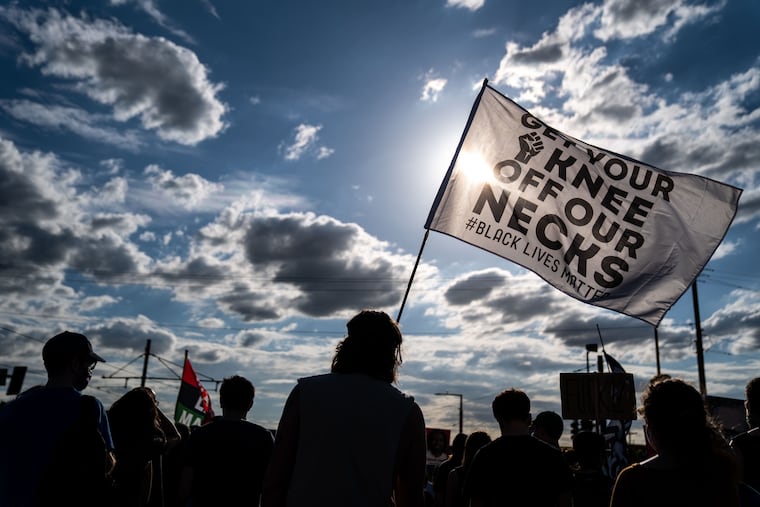Hope is hard to come by a year after George Floyd’s death, but it starts with discipline for police wrongdoing | Opinion
We yearn for actions beyond the ban-chokeholds rhetoric that slaps a bandaid on a gunshot wound, mindful that mass protest has ended and taken with it degrees of our optimism.

The suffocating experiences of people of color, at the hand of people who swore to protect and serve us too, persist a year after George Floyd’s death. Unlike Derek Chauvin, abuse of power and racism remain uncharged, untried, and unconvicted. Americans pushing for justice are still unconvinced that police brutality is a problem of just a few bad apples, or that rotten apples fall far from the apple trees that produced them. Black Americans are still unimpressed by the failed efforts to remove pathogens that have long infected the root systems of far too many trees bearing far too many rotten apples. Instead, a year later, we are ever aware that justice for all has yet to be realized.
We mourn more than Floyd’s death; we mourn the unseen legislative actions we hoped his death would yield. We yearn for actions beyond the ban-chokeholds rhetoric that slaps a Band-Aid on a gunshot wound, mindful that mass protest has ended and taken with it degrees of our optimism.
» READ MORE: Floyd killing prompts some states to limit or ban chokeholds
Our fears have not changed in the last year. Black people still can’t tell which altercation may result in the 911 call that leads to our death, so we bite our tongues as our rights are trampled. We avoid those who were meant to protect and serve us, and when we encounter them, pray they aren’t the last people to hear us speak or see us alive. In our fraught state, we hear others call us paranoid and unfair. “Why is everything about race?” Our weary spirits echo the same question. “Why do you treat all cops like they’re corrupt?” Our hurting hearts want to ask: “Why are all men of color treated as criminals?” We long for accountability, which appears like a mirage. Yet in Pennsylvania, we find more accountability for other heroic professions and less accountability for law enforcement.
The numbers suggest that you’re more vulnerable to state discipline as a health-care worker or educator than as a cop. The Pennsylvania Municipal Police Officers Education and Training Commission (MPOETC) revoked 217 certifications to police officers between Jan. 1, 2009, and Dec. 31, 2019. A revocation occurs when MPOETC decertifies a police officer for an indefinite period The top three reasons MPOETC revoked officers’ certification were: conviction of a disqualifying criminal offense (102 cases); failure to maintain employment as a police officer (96 cases); and cheating (9 cases). MPOETC also revoked certifications when officers submitted document(s) they knew contained false information (5 cases), and when officers have a physical or psychological impairment rendering them permanently unable to perform their duties (4 cases).
By contrast, Pennsylvania’s Department of State Bureau of Professional and Occupational Affairs (BPOA), between fiscal year 2012/2013 and fiscal year 2017/2018, revoked the license of 268 health-care professionals including doctors, nurses, pharmacists, and psychologists. Averaging and rounding the numbers, MPOETC revoked 22 police officers per year within the 10-year period reviewed, and BPOA revoked 45 licensed health professionals per year over the six-year period reviewed.
» READ MORE: As a paramedic, I am not criminally charged for genuine mistakes. Police shouldn’t be, either. | Opinion
Similar statistics exist for educators. For example, a 2018 PennLive article reported that the Pennsylvania Department of Education had revoked or suspended 80 teachers’ certifications in 2017 alone, and another 80 teachers surrendered their certifications amid disciplinary charges.
Health-care workers and educators, like police officers, are called to make tremendous sacrifices in serving our communities. While the pandemic has reminded us of our heroes’ invaluable services, our great gratitude or high admiration cannot cause us to grant impunity for wrongdoing.
We aim to protect vulnerable minors from predatory teachers who misuse their authority. When we fail, and our children are hurt from their actions, we hold those teachers accountable and protect other children from them. We understand the fragility of health and so strive to ensure licensed health professionals are properly trained. We have costly accountability measures in place when health professionals err gravely or repeatedly. In so doing, society has created boundaries to protect the vulnerable, to inspire cautious actions, and to discipline the misuse of authority and power. No profession — no matter how highly we esteem it — should be given broad immunity when unreasonable actions violate the rights of vulnerable victims.
» READ MORE: A guide to how policing laws in Philly and Pa. changed — or didn’t — after George Floyd’s murder
Yet what seems clear for health-care workers and teachers appears less clear for police officers in Pennsylvania. Absent use-of-force laws mandating the actions of individual law enforcement officers and laws requiring use-of-force reporting to create real police accountability, police reform has yet to arrive in Pennsylvania. And no fixation on the ineffective chokehold bans being passed nationwide changes that reality.
A year after Floyd’s death, seeking justice for people of color victimized by corrupt cops still seems like playing the lottery: The losers are exponentially more than the winners. While we may celebrate accountability for Derek Chauvin, we live with the knowledge that the odds of winning justice remain abysmal. Since Floyd’s death, more than 200 Black people have been killed by police in America. Our internal suffocation continues unrecorded. When our flickering hope dwindles, we’re forced to focus on trying to survive.
Samantha Jallah is a Pennsylvania lawyer and writer.